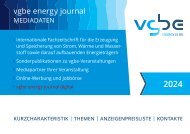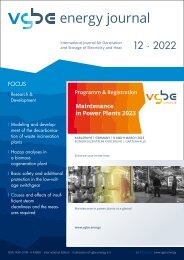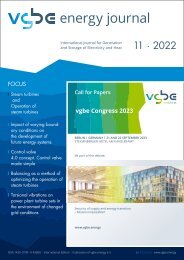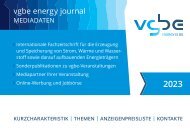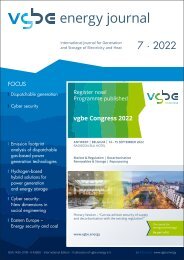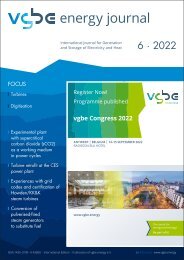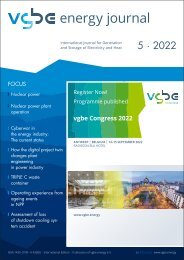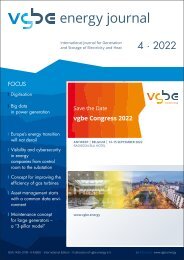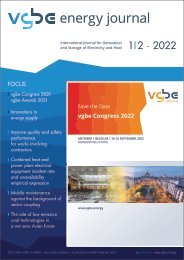VGB POWERTECH 11 (2019)
VGB PowerTech - International Journal for Generation and Storage of Electricity and Heat. Issue 11 (2019). Technical Journal of the VGB PowerTech Association. Energy is us! Power plant operation: legal & technology. Pumped hydro storage. Latent heat storages.
VGB PowerTech - International Journal for Generation and Storage of Electricity and Heat. Issue 11 (2019).
Technical Journal of the VGB PowerTech Association. Energy is us!
Power plant operation: legal & technology. Pumped hydro storage. Latent heat storages.
Create successful ePaper yourself
Turn your PDF publications into a flip-book with our unique Google optimized e-Paper software.
A journey through 100 years <strong>VGB</strong> | <strong>VGB</strong> <strong>POWERTECH</strong> 1 (2002)<br />
Supply Security<br />
Towards a European Strategy for the<br />
Security of Energy Supply<br />
Held at the <strong>VGB</strong> Congress “Power Plants 2001” in Brussels/Belgium<br />
on <strong>11</strong>th October 2001<br />
Kurzfassung<br />
Gesicherte Energieversorgung –<br />
auf dem Weg zu einer europäischen<br />
Strategie<br />
Authors<br />
P. de Sampaio Nunes<br />
Director Conventional Energies,<br />
Directorate General for Energy and<br />
Transport, European Commission,<br />
Brussels/Belgium.<br />
Unser Lebensstil hat sich in den letzten Jahrzehnten<br />
durch die Elektrizität deutlich verändert.<br />
Eine Reihe von Innovationen, wie vollkommen<br />
moderne Formen des Transports, der<br />
Kommunikation, des Handels, der Diplomatie,<br />
der Medizin – diese Liste ließe sich beliebig<br />
fortführen –, wurden durch Elektrizität möglich.<br />
Der Beitrag, den Strom zur zukünftigen<br />
Energieversorgung leistet, ist von entscheidender<br />
Bedeutung.<br />
In den letzten 10 Jahren konnten wir enorme<br />
Veränderungen innerhalb der rechtlichen<br />
Strukturen der europäischen Energiemärkte<br />
beobachten. Wir haben auch gesehen, wie<br />
sich die EVU organisieren und durch gegenseitigen<br />
Austausch Innovationen auf den Weg<br />
bringen. Versorger und Konsumenten finden<br />
gemeinsame Ziele und Interessen. Wenn wir<br />
das Thema “Gesicherte Energieversorgung –<br />
auf dem Weg zu einer europäischen Strategie”<br />
betrachten, sind auch Veränderungen auf<br />
übergeordneter Ebene zu berücksichtigen. Der<br />
Energie- und der Strommarkt sind eng mit<br />
politischen Ereignissen und Entscheidungen<br />
verknüpft. Unsere Möglichkeiten, die Herausforderungen<br />
der Energieversorgung anzunehmen,<br />
sind zumindest teilweise davon abhängig,<br />
wie wir die Umstrukturierung in der<br />
Gesellschaft und der Wirtschaft meistern.<br />
Diese Veränderungen werden im vorliegenden<br />
Beitrag angesprochen, mit Einblick in die<br />
Vorgehensweise der Kommission im Hinblick<br />
auf diese Veränderungen.<br />
Die Stromversorgung und generell die Energieversorgung<br />
sind eng mit anderen Aspekten<br />
verbunden. Die Liberalisierung der Märkte,<br />
grenzübergreifender Handel, der Einsatz sauberer<br />
Umwandlungsverfahren auf der Basis erneuerbarer<br />
Energieträger, die Verminderung<br />
der Emissionen und die Verbesserung der Wirkungsgrade<br />
sind Themen, mit denen sich die<br />
EVU auseinandersetzen müssen, und die weit<br />
über die reine Versorgungsaufgabe hinaus<br />
gehen.<br />
Wenn wir die zukünftige europäische Strategie<br />
und die gesicherte Energieversorgung betrachten,<br />
bin ich überzeugt, dass die Stromindustrie<br />
die anstehenden Aufgaben zuverlässig<br />
und sicher angehen wird. Aus diesem<br />
Grunde wird Strom bei der sicheren Energieversorgung<br />
Europas an Bedeutung gewinnen<br />
und die Elektrizitätsindustrie eine wichtige<br />
Rolle bei der zukünftigen und nachhaltigen<br />
Energieversorgung spielen.<br />
Introduction<br />
I am delighted to see how this congress has<br />
brought together experience from throughout<br />
Europe and beyond. This confirms in my<br />
mind the gradual internationalisation of Europe’s<br />
energy markets. The last ten years<br />
have seen significant changes in the legal<br />
structures of Europe’s energy markets, and I<br />
will come back to this presently. But we have<br />
also seen a transformation in the way energy<br />
operators organise themselves, talk to one another<br />
and stimulate innovation. Producers<br />
and consumers alike are finding common<br />
purpose and common interests.<br />
This brings me to the theme of my speech today.<br />
For, when we look “towards a European<br />
strategy for the security of energy supply”,<br />
we need to consider changes in the wider<br />
context. Energy and electricity markets are<br />
closely intertwined with wider political<br />
events. Our ability to address challenges in<br />
energy supply depends at least partially on<br />
our success in managing wider changes in society<br />
and the economy. In the course of my<br />
lecture today, I will elaborate on these<br />
changes and challenges and offer some insight<br />
into the approach which the European<br />
Commission is considering in order to address<br />
these challenges.<br />
Challenges<br />
First may I begin by recalling the Commission’s<br />
Green Paper which shares the title of<br />
today’s lecture. Most if not all of you will be<br />
aware of the content of the Green Paper.<br />
Many of you have no doubt participated in<br />
the ongoing debate on the Green Paper.<br />
Could I take this opportunity to thank those<br />
of you who have taken part – we have been<br />
very pleased by the response. Apart from<br />
some 120 written submissions, my colleagues<br />
and I have been invited to around<br />
270 events within Europe and beyond in<br />
order to discuss the Green Paper. Add to this<br />
the many thousands of visits to the Green<br />
Paper web site every month, and you have a<br />
sense of how wide the debate is.<br />
The Commission’s Green Paper, you will recall,<br />
crystallises the fundamental dilemmas<br />
facing policy makers in the energy field today.<br />
— Growing energy demand is increasing<br />
our demand for fossil fuels. We estimate<br />
that by 2030 fossil fuels could account<br />
for 86 % of our energy needs in Europe.<br />
And by then the EU will need to import<br />
at least 90 % of our oil and coal and 60<br />
% of our gas.<br />
— We are failing to exploit our indigenous<br />
and renewable sources of energy. Instead<br />
of moving towards our stated objective<br />
of a 12 % share for renewables in the<br />
energy balance, the European Union is<br />
stagnating around the 6 % mark.<br />
— We are missing out on opportunities for<br />
energy saving. It is estimated that 18 %,<br />
that is almost one fifth of the EU’s energy<br />
use could be saved using available technologies.<br />
At the same time, we need to take urgent action<br />
in order to drastically reduce our<br />
emissions of CO 2 . Instead of which, our CO 2<br />
emissions are still rising, and energy use is<br />
largely to blame. If current trends continue,<br />
the EU risks increasing its emissions by 8 %<br />
by 2010. In fact, our objective is to cut them<br />
by 8 %.<br />
— Finally, although the EU is the world’s<br />
second largest energy consumer, our influence<br />
on the international energy stage<br />
is relatively limited. This indicates, in our<br />
view, that our existing structures for international<br />
collaboration with our<br />
partners are inadequate.<br />
When we look at the picture for an enlarged<br />
European Union, of up to 28 member states,<br />
these trends are even more striking. It is true<br />
that some countries have progressed more in<br />
some areas than others, but, overall, the same<br />
challenges re-emerge – growing demand,<br />
growing dependence on imported fuel and<br />
growing emissions of greenhouse gases.<br />
In the Commission’s view, this combination<br />
considerably weakens the security of our<br />
<strong>VGB</strong> PowerTech 1/2002 27<br />
71




